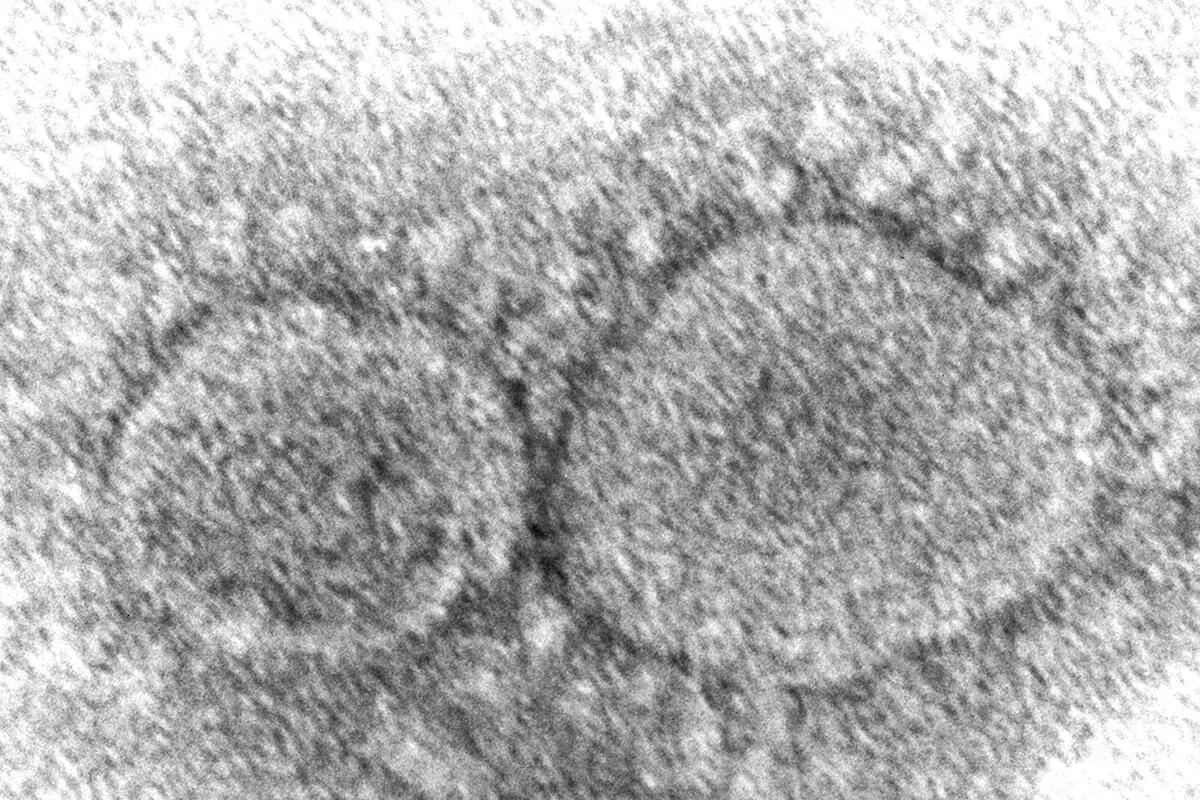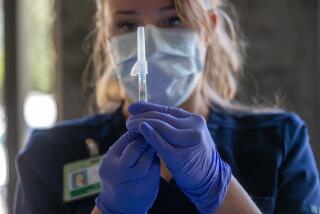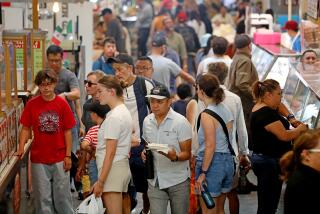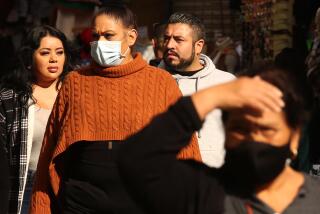Omicron spreads in Southern California as state mask order takes effect

- Share via
The Omicron variant of the coronavirus has expanded its reach in California, with more cases reported in recent days in Los Angeles, San Diego, San Bernardino and Ventura counties.
Omicron’s spread is one of the factors that led California officials to order a statewide mandate for people to wear masks in indoor public settings that took effect Wednesday.
Los Angeles County has confirmed at least 18 Omicron cases, including eight new cases Tuesday. Of the new cases, officials said that none of the patients required hospitalization, and that seven showed symptoms; it was unknown whether the eighth patient had symptoms. Five of the eight were fully vaccinated, and none had received a booster shot.
Two of the newest Omicron patients survived a previous coronavirus infection. Only one of them traveled internationally; two reported recent out-of-state travel.
Three additional Omicron cases were reported by L.A. County on Wednesday night — all among people who were fully vaccinated, and all experiencing mild illness or no symptoms. Two of them hadn’t traveled recently; a third person recently traveled domestically.
“Preliminary data indicates that the Omicron variant is highly infectious and that being fully vaccinated might not provide adequate protection against infection,” the L.A. County Department of Public Health said in a statement. The department “encourages everyone who is eligible for a booster to get one as soon as possible and to continue wearing a mask when in crowded public spaces.”
California’s new mask order affects about half the state’s residents — those who live in counties that do not already have an indoor mask mandate, such as San Diego, Orange, Riverside and San Bernardino counties, as well as wide swaths of the Central Valley and rural Northern California.
The state’s order applies to all workplaces, regardless of whether they serve the public or are open to the public. Masks need not be worn if an employee is alone in a closed office or room.
The requirement also applies to colleges, as well as board and commission meetings, the state Department of Public Health said in a statement.
The order, however, does not require masks among vaccinated attendees of indoor services at places of worship. The state continues to require that unvaccinated people wear masks in indoor worship services, as has been the case in all indoor public settings since June 15.
The order will expire on Jan. 15. There will be no changes in Los Angeles or Ventura counties, which already have an indoor mask order.
Local health officials said the mask order is being implemented as it’s becoming clear that a winter increase in disease is arriving. Over the last three weeks, COVID-19 hospitalizations have jumped by 15% in Orange County, 26% in San Bernardino County, 36% in Riverside County and 47% in San Diego County.
“Universal masking is being put in place because we did see a rise in hospitalizations and cases,” said Dr. Regina Chinsio-Kwong, a deputy health officer for Orange County. And with the Omicron variant looming, it’s possible that the hospital systems could be overwhelmed in the coming weeks, she said.
The head of the World Health Organization warned the public against complacency to Omicron.
“Omicron is spreading at a rate we have not seen with any previous variant,” WHO Director-General Tedros Adhanom Ghebreyesus said.
“We’re concerned that people are dismissing Omicron as mild. Surely, we have learned by now that we underestimate this virus at our peril,” he said. “Even if Omicron does cause less severe disease, the sheer number of cases could once again overwhelm unprepared health systems.”
San Diego County reported four new Omicron cases Wednesday, bringing its cumulative total to six. The latest cases involved people who had been fully vaccinated but had not received booster shots.
San Bernardino County confirmed its first Omicron case Tuesday. The case involved a man who lives in Redlands who was fully vaccinated and had received a booster shot.
“He had traveled to a conference out of state and returned with COVID-19 symptoms,” the county said in a statement. He is recovering at home.
Pasadena, which runs its own health department separate from L.A. County, confirmed its first Omicron case Monday, in a person believed to have acquired the infection locally this month. “The person was fully vaccinated and had a booster dose, has recovered from a mild illness that did not require hospitalization, and had close contacts who are self-isolating,” the city said in a statement.
Ventura County reported its first Omicron case Friday, in a fully vaccinated adult who did not need medical care. “A small number of close contacts have been identified and, to date, all have tested negative and have no symptoms,” the Ventura County Public Health Department said in a statement.
Officials in Ventura County warned that its effective transmission number is 1.3 — meaning that every infected person is giving the virus on average to 1.3 other people, resulting in a spread of the virus rather than a contraction.
“We are experiencing a rapid increase in the spread of the virus that causes COVID-19,” Ventura County Public Health Director Rigoberto Vargas said in a statement. “Given this high and increasing level of community transmission and the possibility of a highly infectious new variant in our county, I urge all Ventura County residents to continue adhering to the measures we know help control the virus: vaccinate, get a booster, wear a mask when indoors in public places or at large outdoor mega events.”
State officials on Wednesday clarified that the new order will not affect counties including San Francisco, Alameda and Contra Costa that have a local indoor mask order but have allowed people in certain indoor settings, such as gyms and offices, to not wear masks — as long as everyone is vaccinated.
“This refinement acknowledges the hard work of the people of San Francisco throughout the pandemic, including the ways in which we have maintained reasonable protections heading into the holiday season. This means that stable cohorts of 100% fully vaccinated people in select settings like workspaces and gyms will continue to be allowed to remove masks when the necessary safety measures have been met,” the San Francisco Department of Public Health said in a statement.
More to Read
Sign up for Essential California
The most important California stories and recommendations in your inbox every morning.
You may occasionally receive promotional content from the Los Angeles Times.














